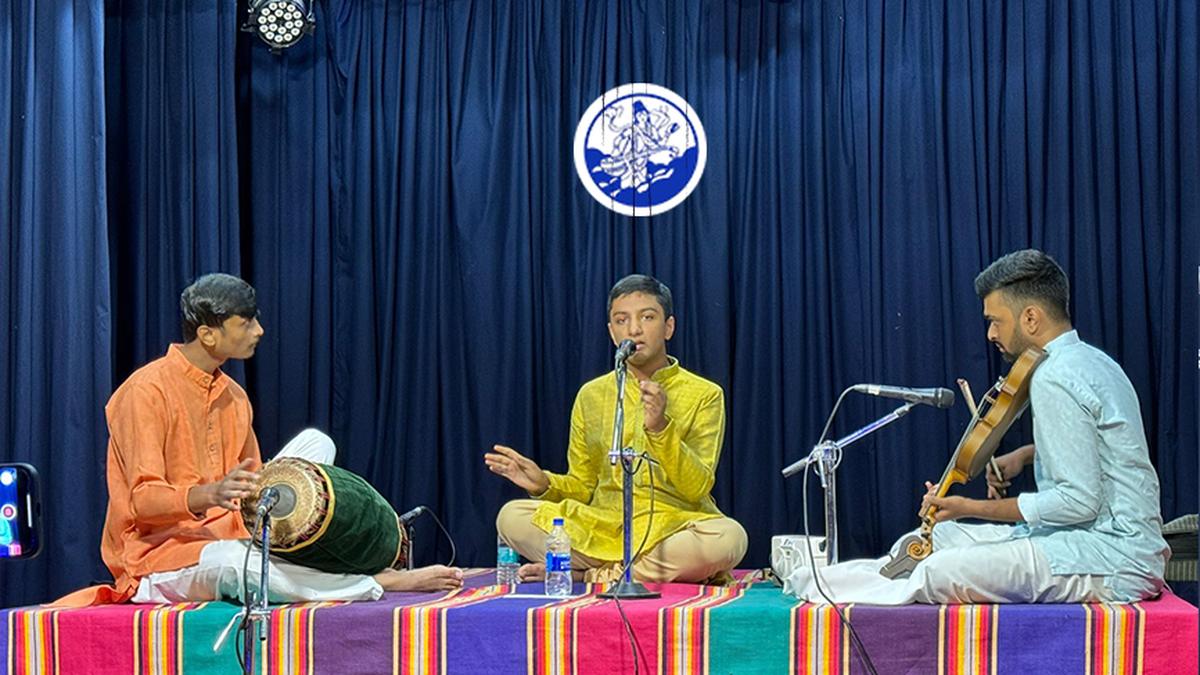
Rishabh Kaushik performing at Narada Gana Sabha Mini Hall. , Photo Credit: Special Arrangement
What stood out in Rishabh Kaushik’s Nadhasangam concert for Narada Gana Sabha held at its Mini Hall recently was his diligence. There was a good mix of ragas and composers and Rishabh showcased his talent adequately. He was accompanied by Indhalur Shyam Raghav on the violin and Vishnuvardhana K on the Mridangam.
The young vocalist began with the lively Kadanakuthoohalam varnam ‘Saranagata vatsale’ by Calcutta Krishnamoorthy. He then proceeded to present Saint Tyagaraja’s ‘Narada gana lola’ in Atana, set to Rupakam. While the rendition was generally neat, swarathanams were off the mark at times.
After a crisp raga alapana of Vachaspathi, Rishabh presented Papanasam Sivan’s ‘Paraathpara Parameswara’. He would do well to keep in mind that splitting the compound word charanaaravinda (charana + aravinda) into charanaa and ravinda (in the anupallavi line sundara charanaaravinda ananda) would rob of both the linguistic beauty and the meaning. While it may not always be possible to break compound words perfectly while singing, owing to the demands of musical aesthetics, the first sangati at least needs to be rendered properly for the sake of expressing cognition. And, it is ‘Subrahmanyan thandhaiye’, and not ‘Subrahmanyam thandhaiye’ in conclusion of the charanam. Rishabh then negotiated the niraval and swara sequence phase at ‘ari ayanum kaanaa’ with sufficient assurance.
Oothukadu Venkata Kavi’s poignant Ritigowla song ‘Enna punniyam seidaeno’ in Misra Chapu was followed by the main kriti ‘Kaligiyuntegada’ by Tyagaraja. After a satisfactory exploration of Keeravani, Rishabh presented the song competently, with niraval and swaraprasthara at ‘bhagawata agresarulaku’. He capped off the recital with a moving tillana in Misra Sivaranjani composed by Maharajapuram Santhanam.
Shyam Raghav’s bow work was tidy throughout. His raga essays, both Vachaspathi and Keeravani, were evocative. Vishnuvardhana’s percussion support was deft, and his thani for the 2-kalai Adi tala was vibrant.
While the concert underlined Rishabh’s promise, it also highlighted areas needing attention, such as dictional fidelity, gamaka felicity, modulation, and emotional engagement with the compositions. With more guidance, hard work and exposure, he can aspire to establish himself in the field.



